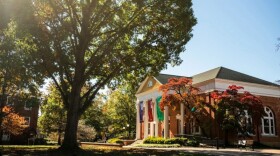This week, the 16,000 members of the Eastern Band of Cherokee Indians have an opportunity to cast their votes on two important referenda, including a measure that could make the Qualla Boundary the only place in North Carolina where marijuana can legally be purchased for recreational use.
The proposal asks enrolled tribal members, “Do you support legalizing the possession and use of cannabis for persons who are at least twenty-one (21) years old, and require the EBCI Tribal Council to develop legislation to regulate the market?”
Context on cannabis
Because of its status as a sovereign nation and a federally recognized tribe, the Eastern Band has the authority to legalize cannabis with regard to state or federal prohibitions.
The tribe formed Qualla Enterprises, LLC in 2022 with plans to grow, distribute and market cannabis in the fall.
The Qualla Boundary’s dispensary, Great Smoky Cannabis Company, held an open house in August and is currently hiring for positions to open. The tribe approved medical cannabis in a 2021 referendum vote and started accepting applications in July 2023.
Qualla Enterprises, LLC General Manager Forrest Parker explained at a tribal council meeting in July that legalization of cannabis would increase the tribe’s profit margins for their cannabis business.
“Gross revenue from medical cannabis starts at $206 million and approaches $578 million by year five. If adult use were legalized, revenue could conservatively reach $385 million in the first year and exceed $800 million by year five,” Parker said in tribal council, according to the Cherokee One Feather.
Tribal Council originally allocated $64 million dollars for the project in 2022 but Principal Chief Richard Sneed vetoed the expenditure in May 2023, citing concerns about the project’s finances. An internal audit of Qualla Enterprises’ finances has been discussed by Tribal Council but it was tabled by council in May and June. In May, Qualla Enterprises shared their own documents with the One Feather to answer questions about the venture. Tribal council is set to discuss the audit again at its September 7 council meeting.
At a recent debate, both candidates for principal chief said they support the tribe’s cannabis project, but Sneed expressed reservations about the financial aspects of the endeavor.
“My concerns are not with the product that's being grown. My concerns are not with the workers down there. My concerns are on the business side of things and I have questions and I've formally requested documents that I never received. And so that's problematic,” Sneed said at the One Feather debate.
Former Principal Chief Michell Hicks who is challenging Sneed said he is glad the question is being put to the people. He said if recreational cannabis does pass, he hoped there will be clear rules put in place about cannabis use.
“I think there needs to be some parameters, around our schools, around our daycares around our youth centers,” Hicks said at the debate. “If it does pass, we need to create parameters that keep, you know, this out of out of the sight and the minds of our children because I don't think it sends a right message.”
The Eastern Band’s cannabis administration and regulation is managed by the Cannabis Control Board. Tribal Council approved $946,000 for the board’s 2024 budget in August. Chief Sneed still needs to approve the resolution, according to the Smoky Mountain News.
Part of the concern about the financial health of Qualla enterprises stems from an investigation into former Governmental Affairs Liaison Jeremy Wilson who was one of the driving forces behind venture.
Wilson served on the board, then called the Cherokee Medical LLC Board. The Office of Internal Audit and Ethics finalized the ethics investigation into his conduct in early August 2023.
The report stated Wilson solicited gratuities and favors from a potential contractor of the EBCI, Sovereign Solutions. The investigation found Wilson received $4,000 dollars from the company. Tribal Council is set to vote on a resolution concerning the ethics complaint at their September 7 meeting, according to the agenda.
A ‘yes’ vote for cannabis will impact all of North Carolina
State and federal legislators and leaders have all eyes on the referendum. Legalizing cannabis in one corner of Western North Carolina could change the way that the substance is sold across the state.
NC District 11 U.S. Rep Chuck Edwards spoke out against the move in an August commentary, “The Cherokee people should say no to pot." Edwards argued that because cannabis is illegal at the federal level, states with laws to the contrary are “thumbing their proverbial noses at federal laws.”
“Here in our beloved mountains, we are already facing unprecedented crime, drug addiction and mental illness,” he wrote. “I can’t stand by and condone even greater access to drugs to poison more folks in WNC, not to mention having even more impaired drivers on our roads.”
Edwards said he respected tribal sovereignty but argued that “the tribe’s rights should not infringe on the overall laws of our nation."
Just two weeks after the commentary Edwards introduced a federal law to withhold federal 10 percent of highway funds for states and tribes that permit the use of recreational marijuana.
“The laws of any government should not infringe on the overall laws of our nation, and federal funds should not be awarded to jurisdictions that willfully ignore federal law,” said Edwards in a press release issued by his office.
At the federal level, Edwards may be the lone opponent of state and tribal changes to make cannabis more accessible.
In August, U.S. Senator Thom Tillis told reporters in Canton that it is time to regulate cannabis like tobacco.
“I think the bell has rung when you have red states and blue states [legalizing cannabis],” Tillis said. “I for one think that we should look at it like tobacco. We should regulate the crops, the FDA should have a role to play in terms of potency, ingredients, delivery methods, we should have a federal excise tax on it, and we should have serious consequences, like the tobacco industry, if you run out of line.”
At the state legislature, a bill that would have legalized medical cannabis passed the Senate in February but died in the House.
House Speaker Tim Moore said there just wasn’t enough support for the measure.
Alcohol attitudes at casino continue to shift
Cannabis won’t be the only mind-altering substance on the ballot for the Eastern Band. Tribal members will also consider a referendum to allow the Trial ABC Commission to issue permits for the sale of mixed beverages on tribal lands to qualified establishments such as restaurants, hotels, convention centers and non-profit organizations.
If it passes, the measure could more options for visitors to the Qualla Boundary. The tribe-operated casino has been the only permitted spot to obtain a mixed drink since 2009. Previously, the casino was dry from its opening in 1997 until 2009 when a referendum allowing alcohol sales solely on casino property passed during former Chief Michell Hicks’ tenure.
There were some exceptions to dry rules such as the 2011 “Blue Ridge Exemption” which allowed alcohol to be sold within 1.5 miles of the Blue Ridge Parkway.
In 2021, voters approved three referenda to expand alcohol sales: one to allow for beer sales in grocery and convenience stores, one to permit beer and wine sales at restaurants and hotels, and one to establish a Tribal ABC store which opened in March 2022.
“The EBCI is currently the only tribe in the United States who owns and operates an ABC Store. By securing the opportunity to regulate and sell on the Qualla Boundary, this is just one more example of the Eastern Band of Cherokee Indians exercising tribal sovereignty,” Sneed said at the time.
Across Western North Carolina, counties have been slow to allow the expansion of alcohol sales. Graham County became one of last counties in the state to allow alcohol sales in 2021.
Recently, small towns have been courting the idea of social districts, where those over the age of 21 can drink outside of bars and breweries with special cups.
In Jackson County, Sylva launched a pilot social district in 2022 and has since expanded the district’s hours. The town was the second in the state to institute the program.
In Haywood County, Waynesville town leaders tabled the idea in July after public backlash.
The passage of the mixed beverage referendum question by the Eastern Band would continue the trend of expanding access to alcohol across the region.
Both candidates for principal chief said they would support the will of the people on the alcohol referendum.
The cannabis and alcohol measures were the only two referenda to move forward from Tribal Council.
In July, the council removed three referendums tied to elections from the ballot including the referendum that would have created an EBCI constitution, established term limits for elected leaders and staggered terms for EBCI elected officials.







